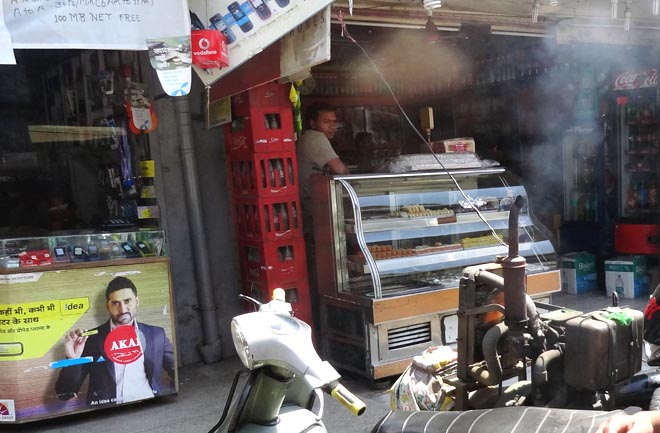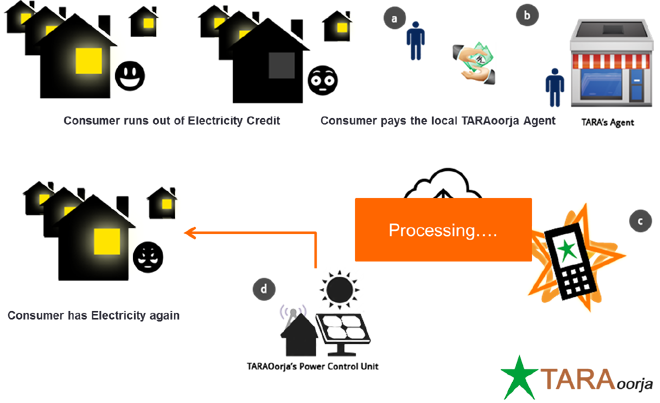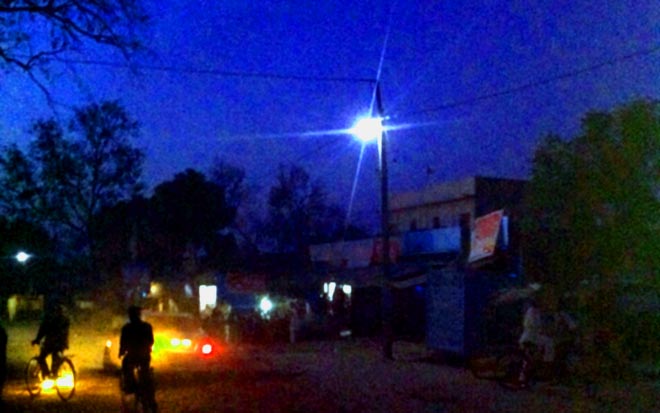Introducing renewable energy franchising for rural electrification in India
Introducing renewable energy franchising for rural electrification in India
Rakesh Khanna and Priyali Bhardwaj of TARA explore how a 'Climate and Development Business Network' initiative backed by CDKN, TARA and cKinetics is introducing new technologies to improve energy access in rural India - in a climate-friendly way.
Lack of access to reliable and assured electricity has significant consequences on economic and human development, especially in rural areas of India. In recent years, the Government of India has been making aggressive efforts to expand access to clean energy through various national and state level schemes dedicated to off-grid rural electricity access. Despite these efforts, nearly half of the rural population in India lacks reliable electricity access and nearly 85 percent depend on biomass. The lack of power not only constrains productive activities, incomes and employment in rural areas, but also hinders the delivery of essentials such as safe drinking water, healthcare and education.
[caption id="attachment_49184" align="aligncenter" width="660"] DG operator in Gopalganj, Bihar.[/caption]
DG operator in Gopalganj, Bihar.[/caption]
Traditional fuel based energy solutions (kerosene lamps) have proliferated across the country despite being costly due to rising fuel prices and a health hazard due to emission of toxic fumes. Local village entrepreneur operated diesel generator (DG) sets coupled to mini-grids have environmental costs and unsuitability for large enterprise loads (flour/rice mills, irrigation pumps etc.) which currently use stand-alone DGs.
Expanding rural energy access is, therefore, necessary for economic growth and human development. Towards this end, The Climate & Development Business Networks (CDBN) initiative, led by the Climate & Development Knowledge Network (CDKN) in collaboration with TARA and its partner cKinetics, seeks to introduce a solution through development of a franchising approach for conversion of the DG operators to Renewable Energy Operators, graduating to a RE based Energy Service Company, known as ESCO.
The project embodies the concept of climate compatible development,developing electricity access through renewable means while reducing carbon emissions, forming an interface between mitigation and development. Renewable Energy Operators can solve the challenges faced by Diesel Generator Operators by servicing both household lighting as well as micro-enterprises with reduced financial and environmental costs.
Challenges for Energy Service Companies (ESCOs)
To ensure the success of the Renewable Energy Service Companies (ESCOs), it is important to understand the challenges that exist. For top-level policy makers in any country or region where energy security and energy prices are national issues, developing the energy services market remains one of the top demand-side initiatives. Against such a backdrop, ESCOs understand the potential of this market and have exhibited a considerable degree of confidence in making investments;but there are a few chokepoints that still exist. First, an automated technical solution is required to check pilferage of power, a major problem in such markets. Second, a transparent light-touch technical solution is required to ensure that all customers pre-pay for their power consumption. Third, a robust technology based system needs to be engineered to manage cash transactions and ensuring that they get credited to the ESCOs bank account with low transaction costs and no leakage en route.
[caption id="attachment_49186" align="aligncenter" width="660"] TARAurja's Revenue Model.[/caption]
TARAurja's Revenue Model.[/caption]
It is quite evident that technology is the only solution to address these challenges. TARA has been developing such technologies in-house over time and these have been deployed at various micro grids. A solution to this effect would also be instrumental in securing revenues to the extent that investors, banks and other financial institutions would be more inclined to commit funding to ESCOs in the rural electrification space. TARAurja, TARA’s branch dealing with energy has developed an Integrated Energy and Revenue Management System, which has the potential to revolutionise the decentralised energy generation and distribution market.
The first key component of TARAurja’s proposed innovationist programmable load limiter, it has been developed to restrict over usage of power by customers through a Zigbee communication model. For example, if a customer takes a power package for 6 hours of electricity he has to pay Rs. 120 for using 1 LED point and 1 mobile charging point; a fixed wattage is available for this customer which s/he cannot exceed and in case the customer tries to exceed the limit, an alarm or light starts blinking indicating the need to reduce the load immediately.
The second component is a cloud-based computing system which has been developed to avoid installing meters and thereby preventing electricity theft; meters can be by-passed for electricity theft whereas load limiters cannot. In this revenue system, a SMS is send to the customer along with physical evidence of payment (receipt) which is automatically updated in TARAurja’s system from where outstanding amount, payments etc. can be easily tracked. The third component comprises of a ‘collection agent’ who signs a contract and pays a fixed amount as security. This agent is responsible for revenue collection and bringing more customers on board where he is given commission on the revenue collected.
[caption id="attachment_49185" align="aligncenter" width="660"] Solar electrified street light.[/caption]
Solar electrified street light.[/caption]
The innovation being engineered will be a result of combining these three technologies together. This innovation looks at demand side as well as supply side management, which makes the Integrated Energy and Revenue Management System unique. Also, it will be an autonomous system requiring minimal human involvement to keep it going.
The innovation looks at finding a pragmatic solution to these three pain points. These points are currently barriers for a larger number of potential ESCOs to enter this market. This solution also ensures that the transactional cost of servicing a dispersed customer base is manageable.
What this would also mean for consumers is that they will be able to choose from various ‘energy packages’ and seamlessly upgrade their electricity connections depending on their needs.
CDKN’s Business Partnerships Programme seeks to encourage and facilitate business-to-business partnerships (North–South and South–South) that increase the knowledge, skills and networks needed for climate-compatible goods and services.
Picture on right: Woman installing solar panels, courtesy DFID. Other images: Courtesy TARA.
